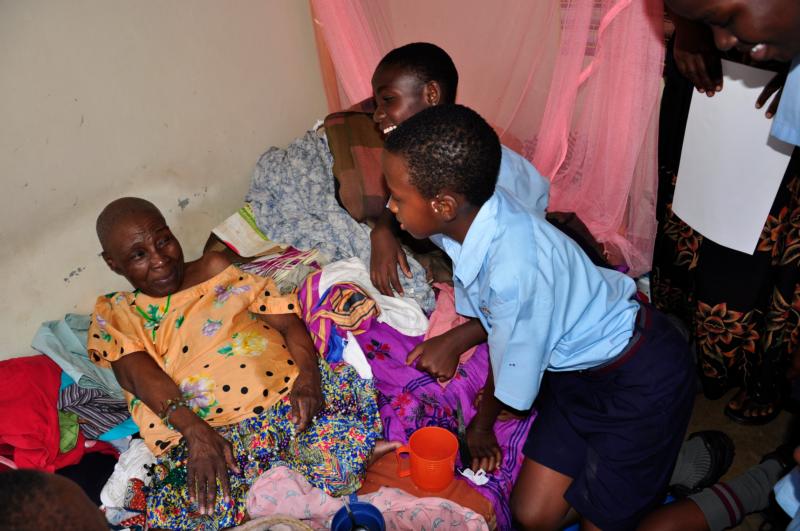
In this undated photo, pupils from a nearby school greet an elderly resident of Mapeera Bakateyamba’s Home in Kampala, Uganda. More than 100 residents live there. (CNS photo/courtesy The New Vision)
by Sister Grace Candiru
KAMPALA, Uganda (CNS) — Each day, the Good Samaritan Sisters bathe, feed and dress the more than 100 residents of the Nalukolongo House of Charity.
The residents range in age from 11 to 102. One resident, who suffers from a spinal injury, has lived at the home for 37 years.
When Pope Francis visits Nov. 28, more than 600 people with different kinds of disabilities will pack Mapeera Bakateyamba’s Home, as it is known locally.
The Nalukolongo Charity Home is situated in central Uganda, but it is home to the needy from different parts of Uganda and beyond. Sister Theresa of Avila Basemera, the home’s administrator, said residents come from Kenya, Tanzania and Rwanda, and the needy are admitted regardless of their religious affiliation.
“We take all religions and we don’t force them to convert because we are serving the same God,” she said. “We take Protestants, Muslims, Catholics and even those who don’t profess any faith. Ours is just to give them holistic help.”
Although the home could accommodate 300 needy people, the nuns are only able to take in 102 people because of lack of financial resources, Sister Basemera said.
The late Cardinal Emmanuel Nsubuga founded the home in 1978, and it officially opened in 1979 to mark the centenary of the Catholic faith in Uganda. The home sits on what many believe is holy ground: The first Catholic missionaries to Uganda arrived in 1879 and taught catechism there. The catechumens, some of whom later became martyrs, would come on Wednesdays and go back to their homes on Fridays each week. And after the completion of their instructions, 14 of the Uganda Martyrs were baptized on the site.
The first Catholic Church was built on the site in 1885. It was destroyed in religious wars, and its replacement chapel houses the relics of two of the Ugandan Martyrs.
Sister Basemera said she chose her work because of her family’s experience. When she was 9, her father was involved in an accident and was bedridden for 18 years. She and other family members had to learn to care for him.
Today, young women who wish to join the Good Samaritan Sisters — also founded by Cardinal Nsubuga — usually help out at the home, Sister Basemera said.
“Our work is with the poor, so those who wish to join us start their initial training from here,” she said, adding that if they are still in school, they come during their school breaks.
She said after their experience at the home, they are freed to make a formal application to join the congregation, but she was quick to note that not all do.
“This work needs love — we do not mind about your degrees,” said Sister Basemera, who has spent nearly 25 years working in three of the charity homes her order runs.
To decide what residents are admitted, the sisters rely on different churches, probation offices, police, schools, hospitals and fellow nuns who encounter the needy. The sisters assess candidates and make their decisions based on the applicants’ need.
“We only admit the number we can manage,” Sister Basemera said, adding the home maintains a waiting list. Those who are admitted are cared for until they die.
“We do not discharge these people once we admit them, because where many of these people are coming from, the people have no time for them,” she said. Many of the elderly at the home have been abandoned by their relatives due to poverty, she added, while others have no one to care for them because their adult children died of AIDS.
The home depends entirely on local donations. Sister Basemera recalled occasions when their store was empty of provisions, but she said she trusts in God.
“I do not worry about anything even if the store is empty. I just say God will take care, and often he does, because we have not had to go hungry,” she said.
Some of the residents who are not bedridden help clean, wash their clothes, prepare food and make some handcrafts, thus lowering the cost of living.
Long before the formal announcement of the papal visit, the home was preparing its residents and the surrounding community spiritually. Every Saturday there was praise and worship from 9 a.m., concluding with Mass at 2 p.m. In between there is counseling and the sacrament of confession for those who wish to receive it.
In anticipation of the papal visit, more people from outside the home participate.
Sister Basemera did not hesitate when asked about the impact of Pope Francis’ visit.
“The pope loves the poor, and we are doing the same,” was her prompt response. “We are in the footsteps of the missionaries. They worked for the holistic development of the people, and we are following them.”







May God Continue to bless all the care takers
Hello,in case someone wants to join you ,,,,,,,,which address can she use.
Thank you.
What I can say is you do a great job , only God can reward you, God bless Samaritan Sisters !